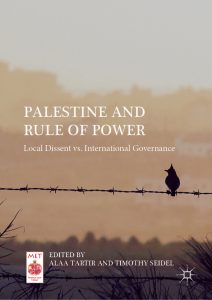Local Dissent vs. International Governance
Edited by Alaa Tartir and Timothy Seidel
Palgrave Macmillan, Middle East Today Series, 1st ed. 2019
252 pages, US$ 85
The newly published Palestine and Rule of Power, edited by Alaa Tartir and Timothy Seidel, explores how the rule of power relates to the case of occupied Palestine, and examines features of local dissent and international governance. The book considers expressions of the rule of power in two particular ways: settler colonialism and neoliberalism. As power is always accompanied by resistance, the authors engage with and explore forms of everyday resistance to the logics and regimes of neoliberal governance and settler colonialism.
They investigate wide-ranging issues and dynamics related to international governance, liberal peacebuilding, state-building and development, the claim to politics, and the notion and practice of resistance. In particular, and through its ten chapters, the book tackles three interconnected themes, namely: 1) resistance, steadfastness, and mobilization against settler colonialism and repression in Palestine; 2) impact of neoliberal external aid and intervention; and 3) security-sector reform and Palestinian authoritarianism.
Following a powerful foreword written by Professor Richard Falk, former United Nations special rapporteur on the situation of human rights in Palestine, and a conceptual introduction written by the editors, the book is divided into three parts that explore the three themes. Part one, “Resistance and Mobilization against Apartheid, Settler Colonialism, and Repression,” discusses and illustrates how the settler colonial presence, the framework and structures of apartheid, and the failure of the Palestinian state-building project are all resisted and confronted. The Foucauldian assertion “where there is power, there is resistance” is examined through multiple inward–outward relations to illustrate how repressive rules and the expressions of power are manifested and also challenged by the Palestinian people.
Part one of the book includes four chapters. Ben White contextualizes the state-building project of the Palestinian Authority (PA) within a de facto condition of apartheid imposed by Israel and argues that “state-building” under occupation has, in fact, laid the foundations for a Bantustan. Timothy Seidel illustrates how sovereignty and its rules can be challenged through the everyday practices of colonized people and through steadfastness and resistance. Nijmeh Ali explores the concept and practice of steadfastness (sumud) through focusing the analysis on the actions and perceptions of the third generation of Palestinian activists in Israel. And Dana El Kurd, through a class and social-strata lens, asks “Who Protests in Palestine?”
Part two of the book, “External Intervention and International Aid,” examines the uniqueness of the Palestinian–Israeli conflict in European Union (EU) discourse and discusses the impacts of international aid regimes driven by neoliberal logics as well as the expressions of solidarity in the international donor community that seek to accompany popular education in the occupied West Bank.
This part is composed of three chapters. Anders Persson reviews 820 EC/EU statements between 1967 and 2009 and asks: “Why has the Palestinian–Israeli conflict dominated European foreign policy discourse for over five decades now? And what were the major policy departures that induced the shifts in the views and positions of the European Union over the decades?” Jeremy Wildeman describes how Western donors have used their power to radically refashion Palestinian institutions and the economy while building a state based on neoliberal Western values, and therefore how neoliberal development aid has contributed to the settler colonization of Palestine. Melanie Meinzer examines other dimensions in the Palestinian aid industry to illustrate how popular education can be used to counteract the depoliticizing and demobilizing tendencies of the donor liberal development paradigm.
Part three of the book, “Security Sector Reform, Resistance, and Authoritarianism,” examines and problematizes the trajectories of security-sector reform and the accompanying emergence of, and resistance to, authoritarianism in Palestine, by focusing on donor-driven security reform and its ramifications on criminalization of resistance and the professionalization of authoritarianism. Alaa Tartir, in his two chapters in this part of the book, argues that while international aid had failed to bring a lasting peace to Palestine–Israel, that aid has been successful in setting the rules for a securitized version of peace as well as for securitized processes of state-building and political reforms. In fact, Tartir argues, cementing Palestinian authoritarianism is a direct result of the shifts in powers and rules dictated by donors’ conditionality and the status of aid dependency.
Palestine and Rule of Power, according to Professor Fawaz Gerges from the London School of Economics and Political Science (LSE), brings together “an impressive list of scholarly and intellectual talents,” and “offers a rich menu of food for thought.” Author Nathan Thrall describes the book as “a deep and unconventional analysis by cutting-edge scholars.” Professor Virginia Tilley argues that through rigorous and bold new theorizing, this book “has a place in any core library on theory of the Palestinian Israeli conflict,” and Professor Richard Falk asserts that Palestine and Rule of Power is “an extraordinary confirmation of the vitality and resilience of the Palestinian people.”


